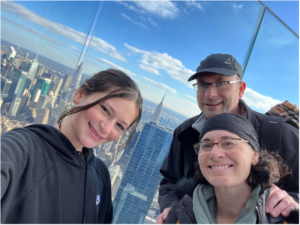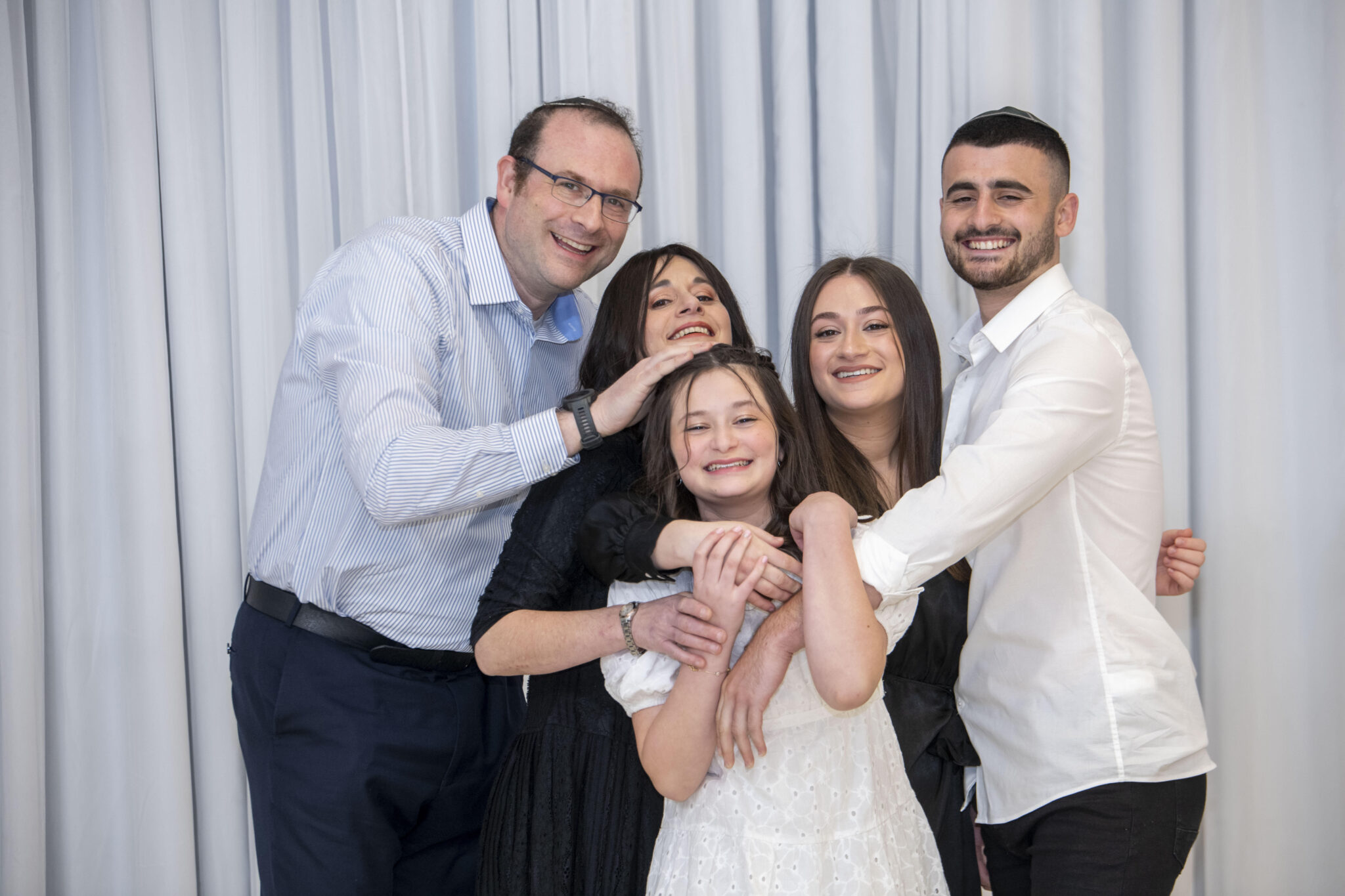An interview with Ben Lazarus on Advocacy: Realistic Positivity and Practical Action are Key. on December 18, 2023 by George Ackerman, Ph.D, J.D.

Biography
In brief, first I am a 48 and a very happy husband and proud dad…married to Gayle since 1997 the year I finished university and blessed with three beautiful kids – two twin boy and girl 21 years old next week and a 14 year old daughter. Can’t forget Buddy our Maltese dog.
Pre PD I was a workaholic for one of the big consulting firms where I am a partner, spending a lot of time travelling and all my time working (way too much) and not finding time for exercise.
Three years ago I was diagnosed with PD in the strangest of circumstances (link to blog post and Lancet article – https://fightingparkinsonss.com/2021/08/23/year-1-of-pd-glass-half-full/ ). At the very start of Covid I caught it on a flight back from NY (a trip my wife said I shouldn’t take which will teach me to listen!) and was patient 305 in the country. After a stint in a Covid hospital and then a Covid hotel I recovered with no issues. A few weeks later I presented with strange symptoms – loss of balance, inability to write and after 9 days in hospital they confirmed PD after a Dat Scan (A second hospital performed another Dat Scan which gave the same result). They ruled out any genetic history but there is no evidence of a link to Covid.
I decided to embrace the fight and started with a medical route of medicine but equally important exercise, diet and attitude (humor where possible). In hospital they told me to start Yoga. I said no. They said Tai-chi, I said no. They said Dance, I said “OK Yoga”. Since then I have done Yoga every day, do boxing and have run most days now up to 10k (before Covid 10 meters was about my furthest).
Since then, it has been the fight…symptoms vary from the usual ones – slight tremor, rigidity, freezing, finding it hard to type, falling to slightly rarer ones like choking attacks, screaming when startled and worst of all is an inability to sleep which has an effect on all the other symptoms (I usually wake at 2/3 am every day) etc.
But there are good times and an effort to keep as normal as possible.
What is your passion and how did you get involved in Parkinson’s awareness and hope for a cure?
My passion is twofold. Selfishly it is to slow down the progression as long as possible so that I am able to continue to be a ‘useful’ husband and father and hope to get to take part in their future and hopefully walking my kids down the aisle at a future wedding, play with grandchildren.
Secondly, to try where I can to encourage people who share the diagnosis with a positive (but realistic) outlook and to make practical changes to life to be able fight PD.
As my neurologist told me – Parkinson’s should be a part of my life and not my life – it shouldn’t take over. It is unfortunately easier said than done.
Regarding a cure, it is a dream but only that.
What events do you participate in?
To be honest (and although you may not want to print this) I suffer from a bit of a phobia which I know many others have…I find it hard to be around other PD patients…groups are hard for me. PD affects people in so many ways the physical manifestations can be overwhelming. This is an area in which I need to deal with face on and start to deal with.
I am still working full time so my events are WhatsApp with other PD sufferers, blog posts, doing a sponsored 10k for three PD charities (one YOPD charity, one PD practical support charity and one research group)
How does this also assist the caregivers?
I genuinely believe it is harder for my wife, kids and family than it is for me. I can fight it (not always successfully) by exercise, pills, diet, attitude. My family have to watch and whilst they don’t feel the physical pain they have the pain of both seeing me go through it and the impact on their lives (from a lost future of fun times to economic challenges etc)
I have chosen to be open with the kids and my family and put it all on the table and openly discuss how I am feeling and joke about it at times. When I came home from hospital my youngest said: Daddy what is your favorite drink….MilkSHAKE. They are going to notice when you fall, freeze or stumble so I felt it important they were part of the story from the start.
How can someone get in touch? What is your website?
Through email family.lazarus@gmail.com
LinkedIn https://www.linkedin.com/in/lazarusben/
What are some of the challenges your three years of PD have shown you?
Four specific things seem to stand out to me which I would address if I had a practical magic wand I would seek to address:
- The time lost– so many people seem to be fighting this on their own and each with limited support and information. In the good early years where people could be using medicine and exercise to fight, they are often hiding from others and with the terminal nature of the disease appointments with health professionals are often 6-12 months apart so time simply slips away and these years are critical. I was extremely blessed due to the fact I was hospitalized because the onset was so quick in 9 days I was diagnosed and put on drugs post Dat Scan. For others this seems to take years and this time is eaten away. If there was a way to deploy faster support to people, get people tested and into the right frame of mind it would help so much. Part of this is the time it takes to ‘come out’ and communicate it.
Other conditions have a more immediate need to deal with them due to their urgency. I am not comparing but the time wasted at the start adds up often to the best years lost.
- Plethora of advice but lack of consistency of advice – I learned early on that so many people have their individual ideas of how to treat PD – it felt when I communicated my diagnosis that all my neighbors had an advanced PhD in PD each with a google based solution – vitamins, minerals, sugars, healers…but there are basics which should be tools for all – medicine options, diet, health, attitude. Almost everyone I speak to has a different route and there is so little consistency. It is such a confusing map to navigate, and people need real help.
3 The two S’s – the biggest impacts on my condition are without question stress and lack of sleep and they are both so hard to address for me. Stress is clearly there by nature because of the anxiety of a terminal condition, and I can measure my PD in reference to stress levels – it is immediate in correlation. Sleep and lack of it is my other trigger. I think if there was a way of directing attention to these factors and practical steps such as dealing with the more emotional side it would help people disproportionally – but this is all talk because I have not found the key.
- Ups and downs – nothing quite prepares for the sudden twists and turns. Taking your eye off the ball for a second can lead to a fall or choking, leaving my pills at home can cause a quick decline….two tips I am trying to learn…(1) To be focused and in the moment – concentrate on walking if balance is the issue, chewing if the issue is choking etc. Multitasking and trying to do multiple things doesn’t work , (2) bouncing back – I am trying to learn to cope emotionally with the downs and not let it lead to depression or a spiral.
In your opinion what is the key to effective advocacy?
I am not an expert in this area – for me I try to be open and honest about the ups and downs of my journey and to be real but positive overall.
What other activities do you undertake to help improve and support your daily living Eg exercise and alternative remedies?
My basic daily routine is:
Yoga works out for 30 mins. I followed a simple program set by a teacher who I still meet once a week and we started with a basic routine I found online and built on it (https://yogainternational.com/article/view/yoga-therapy-and-parkinsons-disease/ )
Running and walking – I do 30/40 mins a day sometimes with Nordic walking sticks.
Boxing – I started with a boxing coach (from Rock, Steady Boxing) but it has morphed into more gym work.
I have acupuncture which helps, fascia physio and see an osteopath.
Alongside my meds (Levodopa, Amantadine, Safrole) I take B12, D, Magnesium, Omega 3 – I have tried hundreds of others including Mannitol, Vitamin C, Zinc.
I have changed my diet – off red meat, eggs, dairy, chemicals (Sodas), low sugar/salt, only whole grain carbs and focus on chicken and fish and a lot of vegetables and salad and fruit.
One additional thing is my faith – each of us has our own spiritual side – but mine as a religious person who believes that everything is for a reason is a source of strength for me.
Why should people who don’t have Parkinson’s care about this?
I am not sure they should – I am one of millions of sufferers with my story but it is a real ever changing journey which I track in my blog every few months so people may associate with it and its up and downs
If you had one song that would tell us more about you or represent your life, which song would it be?
Interestingly my neurologist has prescribed 1 hour of music a day. I don’t have a song that represents life but my all-time favorite song by a mile is ‘Brothers in Arms’. It is not the most positive song in terms of ‘feel good’ but oddly it is comforting – life is a fight and suffering but there is comfort in ‘returning home’ and not being deserted by my ‘brothers in arms.
If you had one final statement or quote you could leave for the Parkinson’s community, what would it be?
Practical and positivity and fighting as much as practical and don’t fight it on your own.

